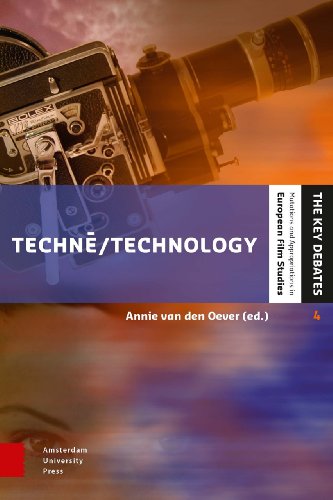Annie van den Oever (ed.): Technē/Technology: Researching Cinema and Media Technologies (2014)
Filed under book | Tags: · aesthetics, art, cinema, film, film theory, image, machine, media, media technology, media theory, perception, phenomenology, philosophy of film, philosophy of technology, photography, technē, technology, television, video, vision

“This fourth title in the series The Key Debates sets out where the term technē comes from, how it unleashed a revolution in thought and how the concept in the midst of the current digital revolution, once again, is influencing the study of film. In addition, the authors – among them André Gaudreault, Geoffrey Winthrop-Young, Martin Lefebvre, Dominique Chateau, Nanna Verhoeff, Andreas Fickers and Ian Christie – investigate how technologies have affected the major debates about film, how they affected film theory and some of its key concepts. This is one of the rare books to assess the comprehensive history of the philosophies of technology and their impact on film and media theory in greater detail.”
Publisher Amsterdam University Press, Amsterdam, 2014
The Key Debates: Mutations and Appropriations in European Film Studies series
Creative Commons BY NC ND License 3.0
ISBN 9089645713, 9789089645715
413 pages
Julia Vaingurt: Wonderlands of the Avant-Garde: Technology and the Arts in Russia of the 1920s (2013)
Filed under book | Tags: · 1920s, aesthetics, architecture, art, art history, avant-garde, biomechanics, body, cinema, communism, constructivism, design, literature, machine, politics, russia, science fiction, sexuality, socialism, soviet union, technē, technology, theatre

“In postrevolutionary Russia, as the Soviet government was initiating a program of rapid industrialization, avant-garde artists declared their intent to serve the nascent state and to transform life in accordance with their aesthetic designs. In spite of their professed utilitarianism, however, most avant-gardists created works that can hardly be regarded as practical instruments of societal transformation. Exploring this paradox, Vaingurt claims that the artists’ investment of technology with aesthetics prevented their creations from being fully conscripted into the arsenal of political hegemony. The purposes of avant-garde technologies, she contends, are contemplative rather than constructive. Looking at Meyerhold’s theater, Tatlin’s and Khlebnikov’s architectural designs, Mayakovsky’s writings, and other works from the period, Vaingurt offers an innovative reading of an exceptionally complex moment in the formation of Soviet culture.”
Publisher Northwestern University Press, 2013
SRLT series
ISBN 0810128942, 9780810128941
322 pages
via Sorin
Review: Boris Dralyuk (NEP, 2013), Tim Harte (Slavic Review, 2014).
PDF (updated on 2022-11-12)
See also the science-fiction film Aelita, Queen of Mars, dir. Yakov Protazanov, 1924, 111 min, based on Tolstoy’s novel.
Comments (2)Sigmund Freud: Writings on Art and Literature (1997)
Filed under book | Tags: · aesthetics, art, art criticism, literary criticism, literature, psychology

For Freud, interpreting a work of art was less the task of assigning meanings to it than accounting for why the reader or reviewer is so powerfully affected by it.
These fourteen essays cover the entire range of his work on these subjects, in chronological order beginning with his first published analysis of a work of literature, the 1907 “Delusion and Dreams in Jensen’s Gradiva” and concluding with the 1940 posthumous publication of “Medusa’s Head.” Many of the essays included in this collection have been crucial in contemporary literary and art criticism and theory.
Among the subjects Freud engages are Shakespeare’s Hamlet, The Merchant of Venice, King Lear, and Macbeth, Goethe’s Dichtung und Wahrheit, Michelangelo’s Moses, E. T. A. Hoffman’s “The Sand Man,” Dostoevsky’s The Brothers Karamazov, fairy tales, the effect of and the meaning of beauty, mythology, and the games of aestheticization. All texts are drawn from The Standard Edition of the Complete Psychological Works of Sigmund Freud, edited by James Strachey. The volume includes the notes prepared for that edition by the editor.
With a Foreword by Neil Hertz
Publisher Stanford University Press, 1997
Meridian: Crossing Aesthetics series
ISBN 0804729735, 9780804729734
290 pages
via tenderage
Review (Richard D. Chessick, The American Journal of Psychiatry, 1998)
PDF (updated on 2014-6-15 to an OCR’d version via Marcell Mars, 8 MB)
Comment (0)
